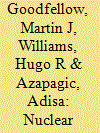| Srl | Item |
| 1 |
ID:
088931


|
|
|
|
|
| Publication |
2009.
|
| Summary/Abstract |
In the first decade of the 21st century, 'hydrosolidarity,' the notion that water management should include considerations of ethics and equity, has influenced international approaches to conducting environmental research and formulating water policy. Since its inception in the 1990s, the term appears frequently across a spectrum of water-related research. It has accordingly permeated discourses and publications on water management. Such rapid proliferation of the concept has helped usher in a wave of transition from conflict management to cooperative efforts between upstream and downstream basin users, as well as a complex paradigm that links both human and environmental welfare. In this paper, we trace the intellectual origins and changing conceptions of hydrosolidarity. We outline some of its applications as well as various reactions to the concept. We close by discussing how the concept can help frame negotiations between riparian states and influence treaty-making and institution-building in river basin settings.
|
|
|
|
|
|
|
|
|
|
|
|
|
|
|
|
| 2 |
ID:
109652


|
|
|
|
|
| Publication |
2011.
|
| Summary/Abstract |
There is currently an international drive to build new nuclear power plants, bringing about what is being termed a "nuclear renaissance". However, the public perception of nuclear energy has historically been, and continues to be, a key issue, particularly in light of the Fukushima nuclear incident. This paper discusses the disparity between perceived and calculated risks based on the last four decades of research into risk perception. The leading psychological and sociological theories, Psychometric Paradigm and Cultural Theory, respectively, are critically reviewed. The authors then argue that a new nuclear-build policy that promotes a broader approach to design incorporating a wider range of stakeholder inputs, including that of the lay public, may provide a means for reducing the perceived risk of a nuclear plant. Further research towards such a new approach to design is proposed, based on integrating expert and lay stakeholder inputs and taking into account broader socio-cultural factors whilst maintaining the necessary emphasis on safety, technological development, economics and environmental sustainability.
|
|
|
|
|
|
|
|
|
|
|
|
|
|
|
|
| 3 |
ID:
183574


|
|
|
|
|
| Summary/Abstract |
Energy communities (ECs) are considered an important element of the current energy transition. Most studies have focused on how to specifically engage citizens in such communities. In this paper, the emphasis is on the objectives of other stakeholders. Only by taking all motivations and interests into account can a successful project be established.
|
|
|
|
|
|
|
|
|
|
|
|
|
|
|
|